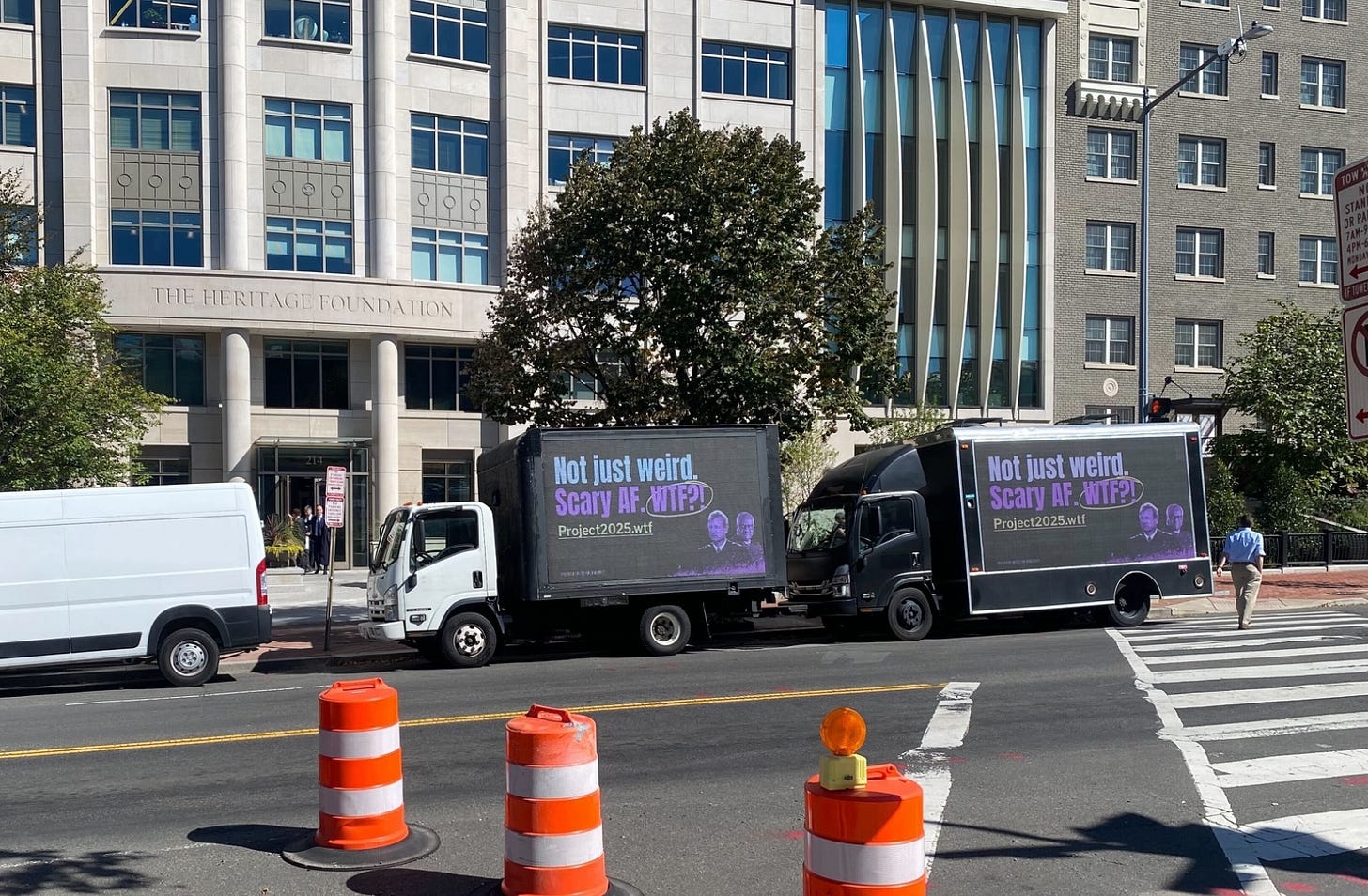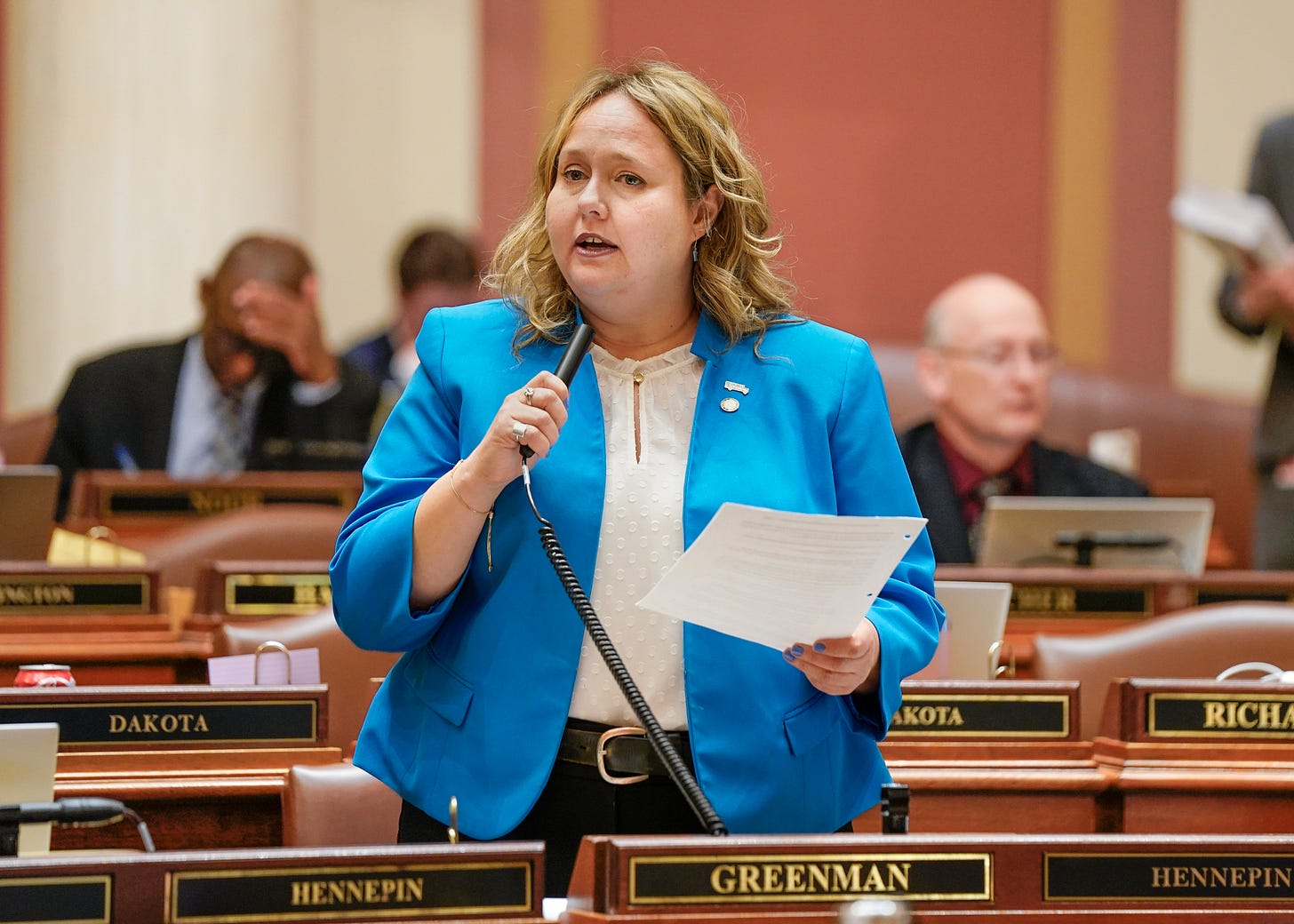Majority Opinions: Issue #6 – What President Kamala Harris's Judiciary Would Look Like
Welcome back to Majority Opinions, United for Democracy's newsletter offering updates, analysis, and tools for returning the power back to the people by holding our out-of-control courts accountable.
There are only 11 days left until Election Day, and the stakes are higher than they’ve ever been. Kamala Harris and Tim Walz represent a forward-looking vision for our country’s future, where we can restore access to abortion, protect access to contraception, protect LGBTQ+ rights, not to mention restoring the government’s ability to regulate polluters to protect our air and water, workplace protections, and gun safety.
Donald Trump represents…well, fascism. It’s easy to dismiss Trump as unserious, what with his hours-long rallies about Arnold Palmer’s anatomy; his claims that the fictional serial killer Hannibal Lecter is not just a real person, but a “wonderful man”; his monologues about his fear of sharks; and whatever else he’s reading about on Truth Social. But Donald Trump is not (just) deeply unserious. He’s a dangerous authoritarian who has already severely damaged our democratic institutions, like stacking the Supreme Court with like-minded MAGA justices who have implemented his agenda even after he was voted out of office in 2020.
If Trump is re-elected, he’ll likely get the chance to confirm at least three more justices to the bench over the next four years, and they will gladly push the deeply unpopular plans from Project 2025, much to our detriment. We cannot let that happen.
That’s why UFD and Court Accountability Now launched a new website that takes an unflinching look at Project 2025, the policy blueprint created by the far-right Heritage Foundation and endorsed by former President Trump. Project2025.wtf is backed by a six-figure ad campaign, featuring digital ads, guerrilla marketing, and creative activations, including mobile billboards that are circling Capitol Hill and the Heritage Foundation’s headquarters to call attention to the alarming policies in Project 2025.
That’s not all. UFD is also ramping up our efforts to turn out young voters in Wisconsin, Michigan, and Pennsylvania — the “Blue Wall” — by meeting young people where they are: Big10 college football games. This bold, on-the-ground campaign is kicking off at three major college games, and will educate voters about the dangers of Project 2025 by blanketing these games with posters, signs, merch, and distribution of thousands of branded condoms and koozies.
With so much at stake, and so much uncertainty ahead, we wanted to make sure that this issue of Majority Opinions captures the same joy that Vice President Harris and Governor Walz have tried to infuse their campaign with. We have essays about their forward-looking vision, including what our judiciary might look like under their leadership. This is our chance to fight for a better democracy, better institutions, and a better Supreme Court. We are proud to stand alongside all of you in this fight.
-Stasha Rhodes, Executive Director, United for Democracy
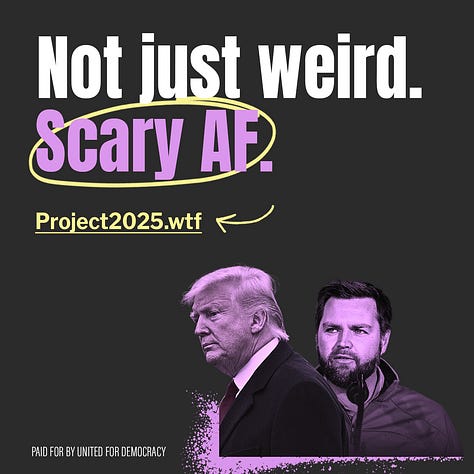
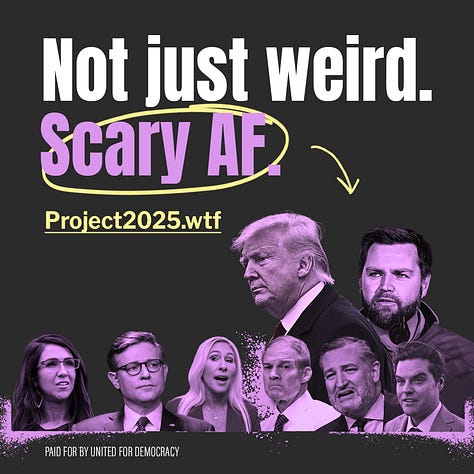
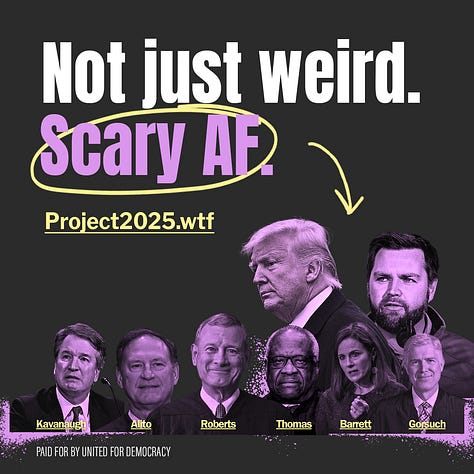
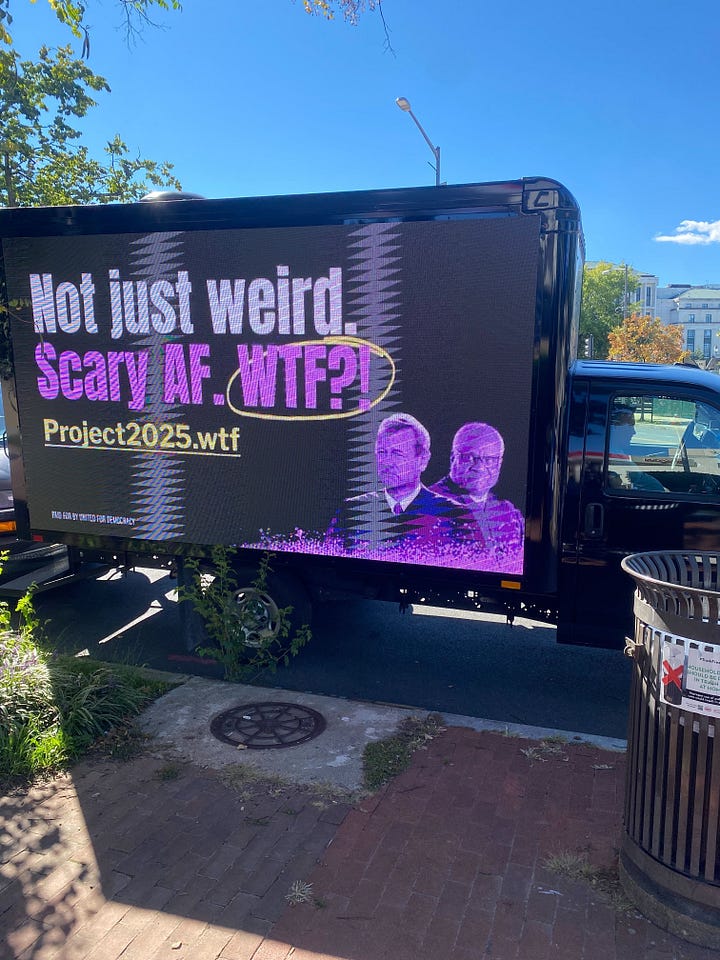
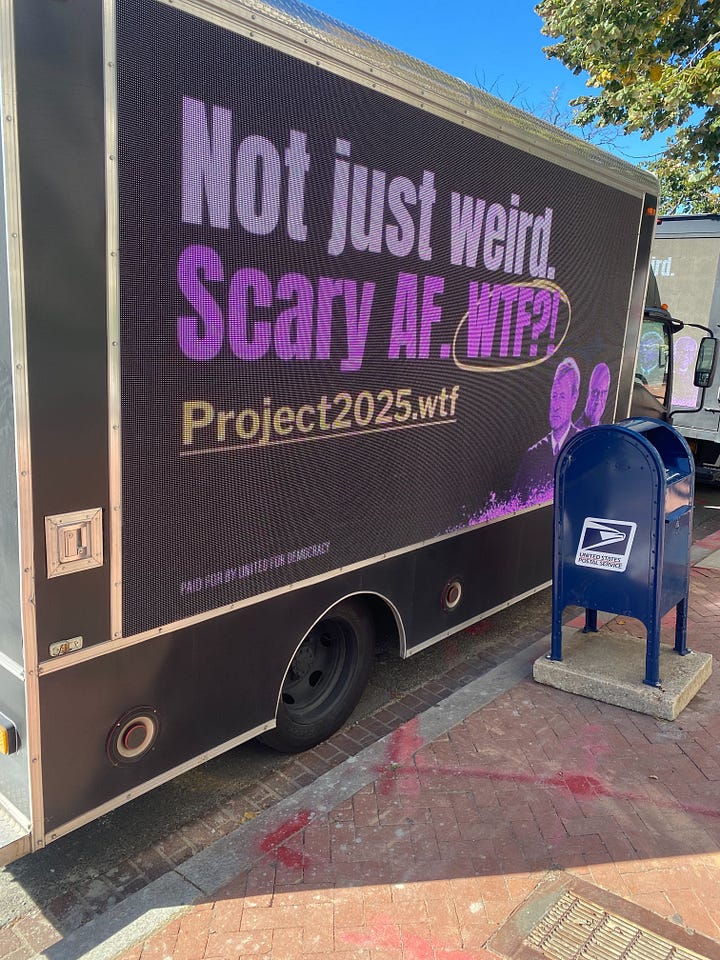
This Is Our Opportunity to Help Kamala Harris Reshape Our Courts
Adapted from remarks by Chris Kang, former Chief Counsel of Demand Justice and former Deputy White House Counsel to President Obama
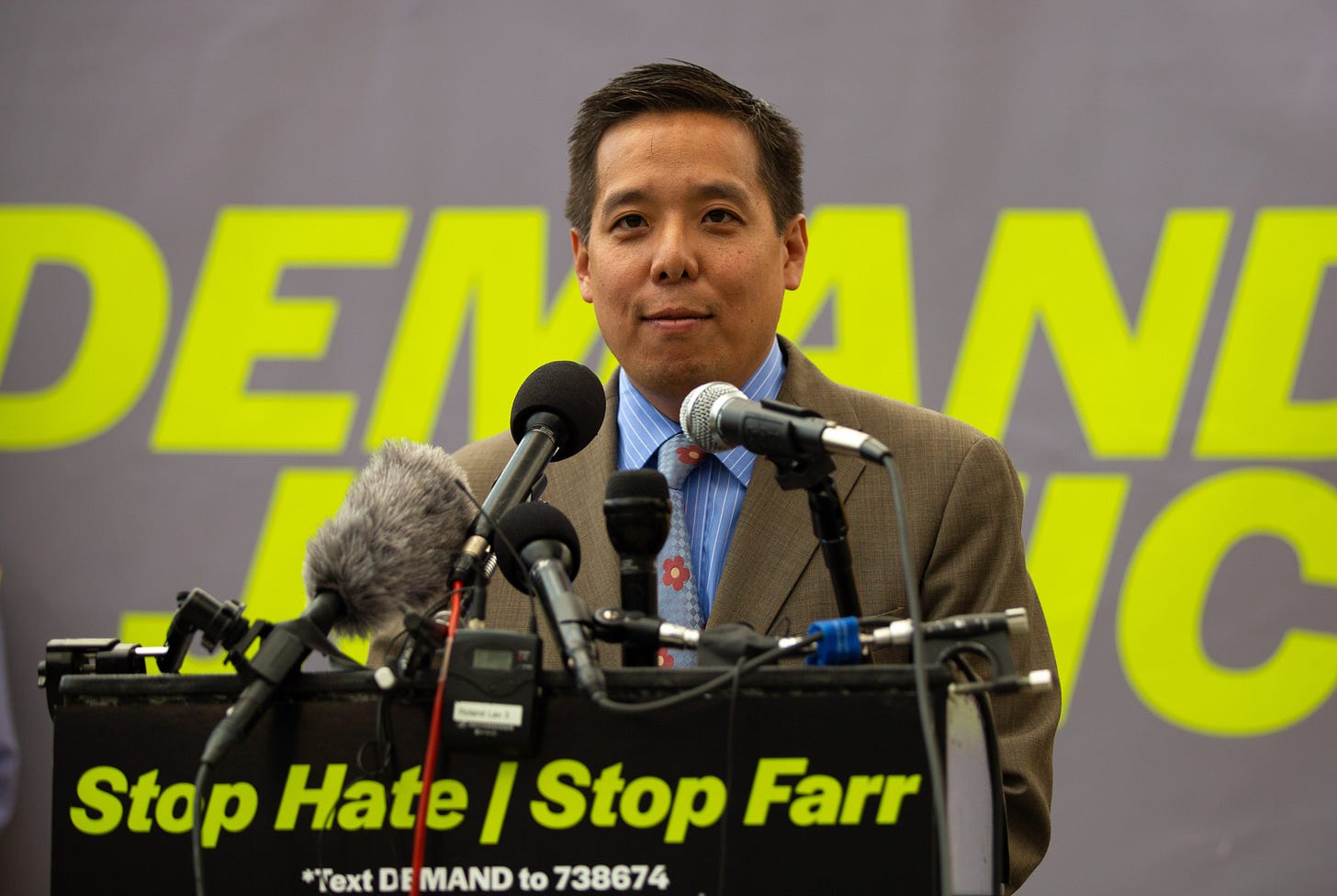
I've been working on judicial nominations for a long time–all the way back to fighting George W. Bush's right-wing judicial nominees, when I worked on the Senate Judiciary Committee for Senator Dick Durbin. Back when judicial nominees were important to coalitions like this one, but not on most progressives’ radar at all. But now, we’re in a moment of incredible opportunity when it comes to fighting for our courts.
I know it doesn’t necessarily feel that way because our rights are under constant attack from the right-wing MAGA justices and judges on the Supreme Court and throughout our lower courts. But we are not helpless to stop them. Because these justices have overstepped so far beyond the Constitution and the rule of law–overturning not only Roe v Wade but other important rights around gun violence prevention, a cleaner environment, and the ability to join a union–voters are more aware of the judiciary and the effect it has on all of our lives–and the role we can play in fighting back.
We have the opportunity now to talk to our neighbors, friends, and community about the courts, how to fix them, and which presidential candidate is best suited for the job. There is no question that candidate is Kamala Harris.
This is a compelling issue for us. Last month, a poll showed that 73% of Harris voters said that Supreme Court appointments are “very important to their vote” — second only to health care, and even higher than the economy! — overwhelming the only 54% of Trump voters who identify the Court as very important to their vote.
In fact, a majority of Americans now disapprove of the Supreme Court. This is the least popular Supreme Court in our history, and not just among Democrats, but among all Americans. By wide margins, Americans now understand the reality that these justices make decisions based on politics and not the law.
The American people know that we can’t have a functioning democracy if one of the branches of our government is broken, and right now the judiciary is in desperate need of repair. In response, President Biden has come out in support of Supreme Court reforms–the first time a sitting president has done so in generations. Vice President Harris and Governor Walz agree with this call for commonsense, structural reforms to the Supreme Court to impose term limits and an enforceable code of ethics.
This is our opportunity. When we think about what this bright sky future of governing could look like, it could look like finally rebalancing the power in government. Over the past couple decades, the Supreme Court has been grabbing more and more power away from the other branches of government. The MAGA justices say that the legislative branch can't legislate on issues from voting rights to gun violence prevention. They say that the executive branch can't do anything about climate change or immigration or a host of other regulatory issues. The MAGA justices are taking all this power for the judiciary, granting themselves the power to veto anything outside their far right agenda. And they are taking power away from the other two branches of government, which are the ones actually accountable to the American people.
We can and will fight back. This is a big picture, huge bright sky moment. And it reflects not just the importance of bringing balance to our democracy, but how far we've come with this opportunity to chart our course forward. The reality is, we can’t move forward at all if Donald Trump is re-elected. We have a chance for real reform, and a more equitable judiciary, if we fight for a Harris-Walz administration and for Senators and Representatives who will support it..
While the movement for structural Court reform continues to build, the most important way in which we can change the courts is by rebalancing our lower courts. Just look at the math (sorry) – there are actually about 870 lifetime federal judges across the judiciary, even though we spend almost all our time thinking about just nine. Those nine might be the most important, but we have to look at the other 861, too. Each president can appoint more than 230 of these judges – a quarter of our lifetime judges – in a single term.
Think about the extremist judges that have unfortunately become household names: Aileen Cannon, Matthew Kacsmaryk, Reed O'Connor, and James Ho. These are the MAGA loyalists who are at the front line of chipping away at our rights and undermining our democracy. Not every case makes it to the Supreme Court, but every case starts in front of a judge just like these. The person picking these judges matters. With Donald Trump, we could very well get 200 more Matthew Kacsmaryks: fanatical partisans with no fealty to the law. Just think: a majority of our lifetime federal judges could be appointed by Trump. But with Vice President Harris, we could get 200 Ketanji Brown Jacksons: brilliant, measured jurists committed to democracy. The stakes could not be more clear.
Republicans understand how important the lower courts are in protecting and advancing their unpopular agenda. That’s why they blocked dozens of President Obama’s incredibly qualified nominees during his presidency–strictly so they could leave those vacancies open for Donald Trump to fill–and then helped Trump set modern day judicial confirmation records, filling 234 seats with his wildly unqualified, extreme judges.
This is a massive problem, but it is one I know that Vice President Kamala Harris can tackle with the same thoughtfulness and rigor she always does.
Vice President Harris has been in the courtroom more than any other president in a long time. As a former prosecutor, she knows what makes a good judge and what makes a bad judge. She knows the importance of ensuring justice and equality and the need for diversity on our courts, including diversity of experience.
I remember the first time I met Vice President Harris. She was a senator then, and I was serving as Chief Counsel at Demand Justice. Demand Justice had just launched a month prior, but we were already busy fighting against Trump’s worst judicial nominees. We hosted a rally to fight the confirmation of Thomas Farr, a former chief counsel for Jesse Helms who had orchestrated voter suppression tactics in North Carolina. We reached out to then-Senator Harris’s office and said, “There’s probably no chance you’ve heard of us, but we really admire your leadership in fighting Thomas Farr’s nomination and would like to invite you to lead our rally with civil rights organizations.” And the response was, “Sign me up.”
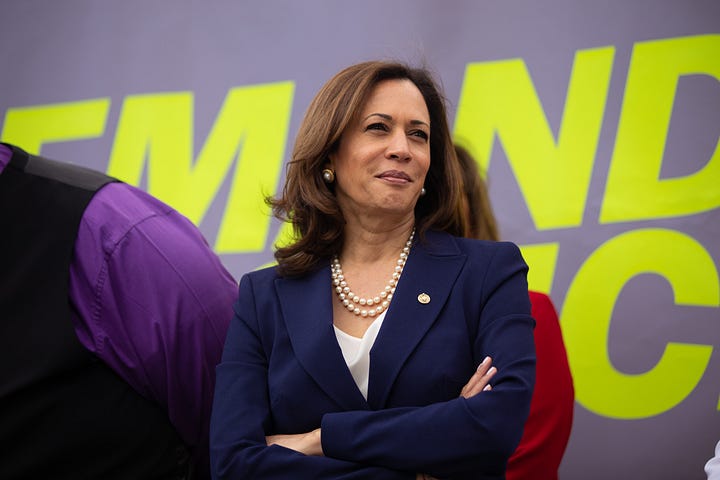
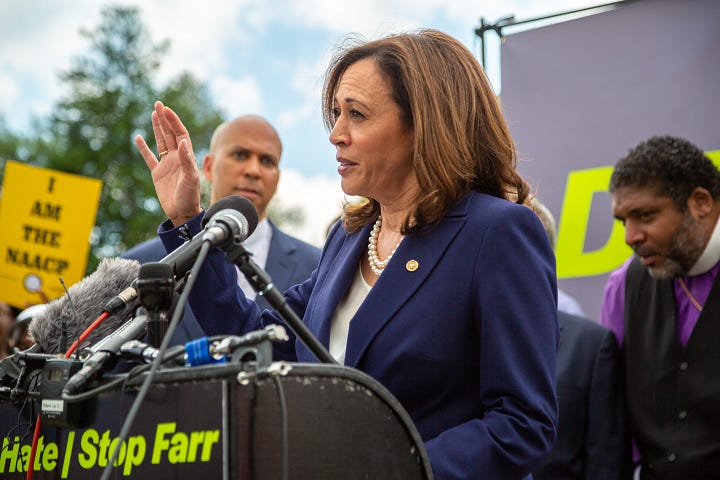
Kamala Harris showed up just like she always does, to fight for better courts, and she helped lead the successful fight to stop Farr from being confirmed to be a lifetime federal judge.
Those are the kind of values and principles we saw every time then-Senator Harris turned her mic on in the Senate Judiciary Committee. Whether it was questioning Brett Kavanaugh or Jeff Sessions or Amy Coney Barrett, you could clearly see her values in the way that she looks at the law and the way she understands its impact on our everyday lives. That's the integrity and strength she'll bring as president.
When I was in the Obama administration, I was excited about the progress we made when it came to diversifying the bench. More than 40% of President Obama’s judicial nominees were women, and more than a third were people of color. That was a 50% improvement over President Clinton’s record, and it took a lot of work, so I thought that it wouldn’t be easy to top. But then President Biden and Vice President Harris showed what commitment to diversity on the bench could really look like: more than 60% of their judges have been women, and nearly 60% have been people of color.
By contrast, and in a completely unsurprising turn of events, 84% of Donald Trump's judges were white, and 76% of them were men.
President Biden and Vice President Harris also have prioritized a diversity of legal experience in their judges and have successfully increased the number of judges who have represented individual people and not just corporations. They have prioritized civil rights and legal aid lawyers, public defenders, and lawyers who have experience fighting for reproductive justice, unions, and consumer safety. We need to carry forward this revolutionary shift in the kinds of judges sitting in our federal courts.
With our help, Vice President Harris and Governor Walz can continue to appoint judges who will follow the Constitution and restore the rights we have lost, and in turn restore our faith in the judiciary as a functional branch of our government.
Every single issue you, your friends, and your neighbors care about are all at risk with a MAGA Supreme Court and judiciary that is more interested in doing favors for the wealthy than protecting everyday Americans. Everything from reproductive freedom to voting rights to climate change to gun violence prevention to economic fairness is at risk in our judiciary, where MAGA judges and justices could have the final say
Our job for the next few weeks before Election Day is to connect the dots for voters and make sure they know that a Harris-Walz administration is the only way to fix our judiciary, and therefore protect our freedoms.
This is our opportunity. Let’s take it.
I’m a State Representative in Minnesota. Governor Walz’s record on judicial nominees will be a huge asset to a future Harris Administration.
By: Representative Emma Greenman, member of the Minnesota House of Representatives
This is an exciting time to be a Minnesotan. For the last two years, we’ve had a DFL (Minnesota’s Democratic Farmer Labor Party) trifecta in our state government, which has allowed us to advance a significant number of our long-standing priorities, including protecting reproductive freedom, advancing voting rights, improving economic justice, and looking at ways we can make structural changes in our government and in our state judiciary so that middle class families, working class families, and just regular folks are the ones calling the shots in our governing decisions – not big corporations.
We are overjoyed that, with the Vice President Harris’s selection of our Governor Tim Walz as her partner on the ticket, we can bring some of Minnesota’s energy and progressive policy work to the rest of the country.
One of the underreported aspects of Gov. Walz’s tenure that’s worth paying attention to, and that’s his commitment to a more equitable judiciary in our state, a goal that he has achieved with a series of highly-qualified and diverse nominees to the bench.
Minnesota uses a de facto hybrid system when choosing its judges, meaning that while there are non-partisan judicial elections and when a judge leaves the bench mid-term, the Governor has the power to appoint replacements. Those appointed judges then run as incumbents on the ballot and are often retained through judicial elections, which is why the Governor’s process for selection and judicial appointments are so important. Walz’s picks have been exceptional, and it’s been incredibly heartening to see his judicial philosophy and his values shape our courts. He is not a lawyer, and yet he understands how critical these appointments are better than many. Frankly, the fact that he isn’t a lawyer is something of an asset – it means he listens intently to the grassroots, legal experts, and regular Minnesotans to ensure their values are represented in our judiciary.
Gov. Walz’s judicial selections fit squarely into his “One Minnesota” plan, which aims to “improve the lives of all Minnesotans by working collaboratively to implement policies that achieve results.” His nominees are a diverse set of candidates across the board: demographically, geographically, and professionally. Having that full set of experiences that reflect more closely the lives of the Minnesotans who may find themselves in front of these judges means a lot to Minnesotans, and serves to build legitimacy and trust in the bench.
When it comes to Walz’s commitment to diversity, the proof is really in the pudding. In the last six years of his governorship, Walz has made 121 appointments, which accounts for 37% of the entire judicial branch. At the district court level. 60% of his appointments have been women. Twenty-five percent of Walz’s nominees have been people of color, and they have been appointed from all across Minnesota, ensuring geographical diversity across the state.
Governor Walz has also:
Appointed the first woman of color to serve as the Chief Justice of the Minnesota Supreme Court - Justice Natalie Hudson
Appointed the first Native American woman to the Minnesota Supreme Court - Justice Anne McKeig
Appointed a majority-female Minnesota Supreme Court
When I think about the people I want on the court making decisions about campaign finance laws and money in politics, criminal justice, reproductive rights, workers’ rights, and so many other critical issues, I want to know that we have judges who have experience working on these issues and not just the typical background in corporate lawyering or criminal prosecution.
This matters, because the courts – federal and state – are intertwined with the ongoing health of our democracy. At a time when the federal judiciary – currently stacked with Trump appointees more interested in extreme right-wing ideology and doing favors for corporations and the wealthy few – is issuing rulings designed to undermine our democratic processes and the freedom to vote, Gov. Walz has ensured that the Minnesota courts will stand as a firewall for voting rights, democracy, and fairness.
For example, in the last two years with our DFL trifecta, our legislature passed dozens of democracy bills, many of which I authored, including the Minnesota Voting Rights Act, restoring the right to vote for folks on probation and parole, automatic voter registration, a prohibition against deceptive practices, and election interference prevention policies. We also passed a set of provisions to get money out of our politics including requiring disclosure of dark money spending and banning foreign-influenced corporations from spending to influence voters.
Naturally, our progress in the legislative process provoked a loud response from wealthy, dark money actors with unpopular agendas who can’t win through normal, small-d democratic means so they sue to overturn the provisions in federal court. Not unlike Project 2025 and other unpopular MAGA policies, what they are pushing is unpopular and would never win in the court of public opinion.
These forces rely on dark money to try and influence political outcomes through other means, and often rely on the courts to do their dirty work for them. Dark money groups have had success in federal courts, thanks to some well-placed MAGA judges, but they have been less successful interfering with popular policy in Minnesota courts. Our courts have upheld our voting rights restoration policy and they’ve rejected attacks on provisions protecting voters from deceptive practices in our elections.
In Minnesota, thanks to Gov. Walz’s nominees, we can trust that the legal outcomes issued by our courts will be fair and rooted within a valid legal and constitutional framework.
But we know that our progress still faces threats in the federal courts. That’s why it’s so important to support a ticket that has an established record in nominating and confirming judges who are committed to the law, the constitution, and to our democracy. That’s what a Harris-Walz administration offers.
I’ve seen Gov. Walz’s commitment to the judiciary up close, and now he will bring those same Minnesota values as Vice President.
Rep. Emma Greenman represents the communities of South Minneapolis (District 63B) in the Minnesota House of Representatives. She is a voting rights lawyer with over 15 years of experience working on democracy and justice issues as an attorney, a policy expert, and an advocate. In the Minnesota legislature, she is the chief author of the Democracy for the People Act and a leader in the effort to expand democratic participation and rights in our workplaces, our communities, and our government. Before entering the legislature, she led the Center for Popular Democracy’s national voting rights and democracy program. Rep. Greenman also practiced law as a public defender and as a civil litigator and holds a law degree from UC Berkeley School of Law, a Master in Public Administration from Harvard’s Kennedy School of Government, a BA from George Washington University, and is a proud Minneapolis South High graduate.



